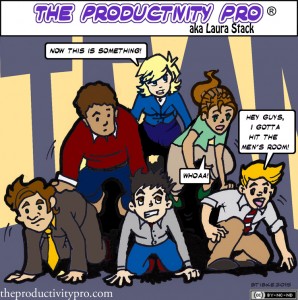 It’s unfortunate that the term “codependent” has taken on such negative connotations over the past few decades, because otherwise it would be ideal for expressing the value of teamwork. Indeed, I would argue that all teams are codependent to some extent, in that each of us depends on our teammates to do their jobs promptly and professionally.
It’s unfortunate that the term “codependent” has taken on such negative connotations over the past few decades, because otherwise it would be ideal for expressing the value of teamwork. Indeed, I would argue that all teams are codependent to some extent, in that each of us depends on our teammates to do their jobs promptly and professionally.
In this sense, “codependent” works in the same spirit as “cooperation,” since we help our teammates—our coworkers—function at the height of their productive abilities. Perhaps a less loaded (if less accurate) term for this relationship would be “interdependent.” Each team member, from the leader down to the summer intern, engages with each other to produce the most product possible in the least amount of time.
Ironically, teamwork is both the glue binding our teams together and the oil that keeps production running smoothly. In the best teams, everyone has a different job contributing to the outcome. We’re all individuals with unique experiences and skillsets, who use our capabilities, viewpoints, and opinions to keep the production machine running with peak efficiency. This is why teams are so necessary, especially in the modern world.
While there may have been a time when “Renaissance people” could competently handle just about everything life threw at them, our technologies and work functions have become so specialized, and our approaches so differentiated, no one can really know and do it all anymore. Nor would we have the time to do so, even if we could. We need the amount of labor a team provides, just as much as our divergent perspectives.
Smaller teams tend to work together best, because of communication limitations; the more people involved, the more the different points of communication. We need to be able to work effectively toward the same goals while easily sharing our skills and expressing our opinions and perspectives in complementary ways.
Besides the reasons already discussed, teams rock because:
- You all contribute to the decision making.
- You’re all focused on one goal.
- You generate more and better ideas.
- You solve problems more easily.
- You have a sense of belonging.
- Teamwork encourages commitment.
- You always have some level of support.
- You provide each other with feedback.
- You each tend to learn more.
- Peer pressure promotes productivity.
- Membership encourages accountability.
- The highs are higher, and the lows easier to handle.
Many teams also experience synergy, where the product exceeds the sum of the parts, though this isn’t inevitable. Nevertheless, the best teams do foster empowerment and ownership of the job, as well as experience working in a cross-disciplinary environment where hybrid ideas can grow, producing more flexible, responsive workers. Sometimes they even yield leaner, more disciplined groups.
Another positive for teamwork is what one researcher calls a higher “bus factor.” The more people on your team, the more who can be hit by a bus, quit, get fired, or go on medical leave without the project grinding to a halt. It’s a bit grim to consider, but we live in the real world; and as the saying goes, the show must go on.
So while we can and should all learn self-reliance, teamwork remains the way to go with most jobs. This applies not to just white collar environments, but to manufacturing, Madison Avenue marketing, virtual offices, and for that matter sports teams, chain gangs, and hunting parties. We humans are gregarious, and we tend to do everything better in groups—whether this involves building stone structures visible from space, or growing the International Space Station from which we can see the Great Wall of China and the Pyramids of Giza.
Call it interdependence if you must, but realize codependency is crucial in the workplace. There may be times you need to get away for a quiet bout of report writing or a vacation, but the true producers always come back together to merge with the cool conductivity of a good team.
© 2015 Laura Stack. Laura Stack, a.k.a. The Productivity Pro®, helps professionals achieve Maximum Results in Minimum Time®. For nearly 25 years, her keynote speeches and workshops have helped professionals and leaders boost personal and team productivity, increase results, and save time at work. Laura is the author of seven books by large publishers. Her newest book, Doing the Right Things Right: How the Effective Executive Spends Time, hits bookstores in January. Widely regarded as one of the leading experts in the field of performance and workplace issues, Laura has been featured in the Wall Street Journal, the New York Times, and USA Today. Connect via her website, Facebook, or Twitter.


